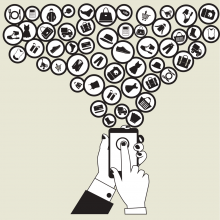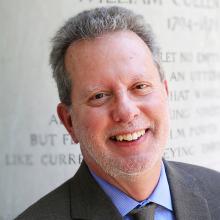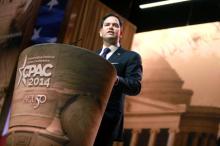Politics

For Christians, it’s sometimes hard to admit believing in the supernatural, the legitimacy of miracles, an afterlife, and following an ancient text written thousands of years ago by numerous authors that have been divinely inspired by an all-knowing, all-powerful, and omnipresent God.
At first glance, Christianity seems at odds with an increasingly “secular” culture that views spirituality as old-fashioned and irrelevant, but our society reveals that everything — and everyone — is spiritual on some level.
At first glance, Christianity seems at odds with an increasingly “secular” culture that views spirituality as old-fashioned and irrelevant, but our society reveals that everything — and everyone — is spiritual on some level.
1. The Religion of Sport
Few people pray more fervently, earnestly, and passionately than when their favorite sports teams — and athletes — are competing.
With arms outstretched, they wildly clap, cheer, chant, cry, and scream at the top of their lungs. Wearing costumes, jerseys, and following

RELIGION AND electoral politics tend to be mutually debasing. Take the apparent exception, Jimmy Carter. His politics were informed by his theological insights: a regard for the poor and despised (he was the first U.S. president to take the Third World seriously); a sense of human limit (he did not take it for granted that Americans have a right to consume a disproportionate share of the world’s goods); and a recognition of the humanity of others, even of enemies (the Soviet Union was not the Evil Empire for him).
AS ICE CREAM entrepreneurs, Jerry and I have been on a journey that has led us squarely to the conclusion that, while there are many ways that a business can use its power to improve people’s quality of life, the most effective lever for economic and social justice is the government.
Business can use its voice to influence government for good. But too often big corporations use the system of unlimited political “donations”—a system that John McCain calls “legalized bribery”—to skew the government in favor of their own narrow self-interest. That’s why I’m devoting my time and treasure to hacking at a root cause of injustice: big money in politics and crony capitalism.
A nationwide poll of small-business owners commissioned by Small Business Majority found more than three-fourths (77 percent) of small employers say big businesses have a significant impact on government decisions and the political process, whereas a mere 24 percent say small businesses have a significant impact on the process.



Religious groups are battling the state of California over whether employee health insurance plans require them to pay for abortions and some forms of contraception that some find immoral.
So is the state forcing churches to pay for abortions? It depends on who you ask.
The issue gained traction after Michelle Rouillard, director of the California Department of Managed Health Care, sent a letter to Anthem Blue Cross and several other insurance firms in August warning providers that state law requires insurers to not deny woman abortions. “Thus, all health plans must treat maternity services and legal abortion neutrally,” she wrote.
Rouillard wrote that state law provides an exemption for religious institutions.
“Although health plans are required to cover legal abortions, no individual health care provider, religiously sponsored health carrier, or health care facility may be required by law or contract in any circumstance to participate in the provision of or payment for a specific service if they object to doing so for reason of conscience or religion,” she wrote.
“No person may be discriminated against in employment or professional privileges because of such objection.”
However, two legal groups have filed complaints with the U.S. Department of Health and Human Services, alleging the California rule puts faith-based organizations in a position to violate their conscience.

We met over email in the spring of 2012. I had just co-launched a literary blog and our mutual friend introduced us as fellow writers. Stephanie and I immediately hit it off. Not only was she a gifted writer, Stephanie and I shared a similar sense of humor and sensibility. As we got to know each other and began to write with each other, we discovered a ridiculous number of similarities and common points of interest, including and especially, our shared Christian faith. To paraphrase C.S. Lewis, it was as though every other email was a “you too?” moment.
Then one day I wrote a piece that indicated my progressive political leaning. The 2012 presidential election was heating up and though the piece was not overtly political, it revealed my beliefs. Stephanie, it turned out, was a conservative.
This news wasn’t really a big deal to me — I am used to have friends and family who have different political beliefs, and I even got my first start in the blogging world as the token “progressive” Christian through a conservative friend’s blog. But things were getting heated with the election and we didn’t know each other that well.
Stephanie and I began to email back and forth about politics through the lens of faith, which tested whether we were Christians or ideologues first. We shared two things in common in holding our different political beliefs because: 1) we had both thought a lot about them, and, 2) shockingly, neither of us had an interest in destroying America. Eventually Stephanie and I decided to co-write a bipartisan series for our website, looking at partisanship through the lens of faith (summary: love for Jesus makes for fertile common ground).
After the election it was hard to ignore the mix of apocalyptic expressions of woe and the tone-deaf exclamations of victory. Each came with its own vilification of the other party. I found myself at parties with fellow progressives defending conservatives because the caricatures of them were plainly wrong, and I would be hurt if Stephanie didn’t defend me against caricatures of progressives.

The 2014 election-year posturing forces me back to November, 2010, when a living parable walked into freedom after 15 years of house arrest. Aung San Suu Kyi, Burma/Myanmar's opposition leader, waved to her supporters and awakened our stagnant conscience.
Suu Kyi ranks among the elite of real-life parables. "I should be like them," we typically think. "Everyone should." They're the true norm. Saint Francis was one such parable. So was Gandhi. So were Mother Theresa, Nelson Mandela, and Alexsandr Solzhenitsyn. Pope Francis may be another. They shame our insipid, glitz-and-glitter leaders, whether they're overpaid CEOs or I'll-say-anything-to-get-votes candidates. They show us that politics is more than winning elections and business is more than making money.
In fact, they shame us all. We reward the attack ads. We elect the politicians and hire the CEOs. We diminish human beings to mere consumers and interest groups and file them into marketing categories. We breed our rant-and-rave culture and turn it loose.

“There is nothing quite like the African bush to sooth and rejuvenate.” That experience was conveyed to me by a South African church leader who has been helping plan the speaking tour I just arrived for here in this beloved country.
My wife, Joy, and I decided to use this wonderful speaking invitation to South Africa as an opportunity to take our annual August family vacation here. We arrived for a week of rest before the tour began and spent a few beautiful days on the lovely beaches of the Indian Ocean, still warm even for this end-of-winter period. But then the last two days, our Washington, D.C.-based family did something we have never done before — visited the game park and wetland reserve to see some of God’s most extraordinary creatures. Of course we’ve seen these animals in zoos before, but we now had the opportunity to see them roam freely in their natural habitat. For a bunch of city kids like us, it was truly amazing.
In Hluhluwe Game Reserve, beautiful zebras slowly grazed with a South African sunset behind them over the mountains. There are no more graceful creatures than giraffes, elegantly tasting the leaves on the tallest trees as they wander together at peace. Buffalos with great horns shared the terrain with antelopes that showed us their speed when they decided to run. And hyenas really do laugh off in the distance.

When I was a child, I lived in a black-and-white world of all-this or all-that.
Humankind meant my family. The world meant my neighborhood. Religion meant my church. Politics meant my father’s beliefs.
Oh, I was aware that more was out there, but it had little claim on my imagination or loyalties. My world was complete. There were no gray areas, no compromises, no maybes.
That was a child’s view, reality writ small. In time, I advanced beyond it, until the world became large, complicated, and gray, with places beyond imagining, people totally unlike anyone I knew, ideas beyond anything I heard at my parents’ table.
It’s called growing up. Discovering through knowledge and experience that the little I grew up knowing wasn’t enough to know.
We are witnessing today a headlong retreat into the not-knowing and simplistic partisanship of childhood. Ideas that make people uncomfortable are banished. Science that calls faith into question is shouted down. Politics isn’t just hardball, it’s dumb-ball: I must win, at any cost, and you must lose. I am right, and you are wrong. My tribe is the only tribe that has value and rights.




If Christians stopped bickering about church, presenting sex as a first-order concern, telling other people how to lead their lives, and lending our name to minor-league politicians, what would we have to say?
We need to figure that out, because we are wearing out our welcome as tax-avoiding, sex-obsessed moral scolds and amateur politicians.
In fact, I think we are getting tired of ourselves. Who wants to devote life and loyalty to a religion that debates trifles and bullies the outsider?
So what would we say and do? No one thing, of course, because we are an extraordinarily diverse assembly of believers. But I think there are a few common words we would say.
50 years later, poverty is still an issue in America.
I cannot say I am the greatest dancer. I enjoy all types of music. The rhythms of my eclectic taste often entice me to move. Naturally, I easily find myself swaying this way or that way. My feet are not far behind. Only sheer foolishness would compel me to compare my dancing with grace and gifts of Beyonce, Tina Turner, or any champion from Dancing With the Stars. I know my limits. That’s one of the first steps to being successful: know what you can and cannot do.
I can do the basic two-step. A step to the right. A step to the left. A step up. A step back. I do not have to think about it. Just a simple one-two, one-two, and the sounds tickling my ears manifest in my feet. There is no harm if all I do song-in and song-out is slide to right, shimmy to left, take it to top and prance it back. A simple motion of one foot forward and one foot backward, and I am at peace relishing in the music of the moment.

While there are no biblical texts speaking directly to the issue of money in politics, biblical principles are still relevant, and people of faith have an important role to play in the emerging debate about the future of our democracy. Before exploring those principles, however, it is important to understand the serious issues of inequality currently present in our system, and the correlation between inequality and the money flooding our political system.
The richest 1 percent own more of the nation’s wealth than the bottom 90 percent. The richest one-tenth of one percent have as much pre-tax income as the bottom 120 million Americans.
In Affluence and Influence, political scientist Martin Gilens concludes that, “The preferences of the vast majority of Americans appear to have essentially no impact on which politics the government does or does not adapt.” He details the data throughout his book that clearly demonstrates policy makers are only listening to the wealthy donor class. This situation has been made even worse by the Supreme Court’sCitizens United in 2010, which allowed a huge influx of money to flood our political system after declaring the personhood of corporations.
The Court’s more recent decision in McCutcheon v FEC made matters even worse. Before McCutcheon, one person was able to contribute up to $123,000 to political candidates and parties. In striking down this aggregate limit, the Court paved the way for individuals to contribute more than $3.5 million directly to candidates and party committees. In a report detailing the potential impact of McCutcheon, Demos predicts the decision could result in more than $1 billion in additional campaign contributions by 2020.

After the final whistle ended a hard-fought World Cup match, Brazilian star David Luiz consoled Colombian star James Rodriguez.
They exchanged jerseys to show their mutual respect, and Luiz held Rodriguez close as the losing player wept in frustration.
This poignant moment was much more inspiring than a string of fouls, some intentional, that sent Brazil’s Neymar to the hospital and left players on both sides shouting in agony.
During play, soccer seems eerily like the world outside: opposing forces collide, do anything to gain advantage, bamboozle the game’s referees, shout in mock pain and real pain, challenge joints and muscles beyond their capacity, give everything for their nation’s cause — all while spectators whoop and holler in the safety of the stands.

How many voters know that former Florida Gov. Jeb Bush is a Roman Catholic? Or that Texas Sen. Ted Cruz is a Southern Baptist, not a Latino Catholic? Or that Florida Sen. Marco Rubio worships at both a Catholic parish and an evangelical church?
More importantly, does it matter?
Actually, it does in today’s Republican Party, where a number of factors have forged a new religious identity that supersedes familiar old categories.
These prominent Republicans are emblematic of the new religious amalgam that, in many instances, has helped refashion denominational differences that were once almost insurmountable. Look no further than the stunning Virginia primary victory of Dave Brat, a Catholic with degrees from a Reformed Protestant college in Michigan and Princeton Theological Seminary, who took down House Majority Leader Eric Cantor last week.

Last week, I celebrated my birthday. This annual occurrence has taken on new meaning in light of what happened last year around the same time. I had major surgery for prostate cancer. The diagnosis was quite unexpected, with absolutely no signs or symptoms beforehand. But my health provider, Kaiser Permanente, caught it in time and the doctors at the National Institutes of Health performed a very successful operation that removed all of the cancer. So far, regular tests have shown there is no more cancer in my body and for that, our family is very grateful.
Gratitude is the right word and the deepest feeling I had while celebrating my birthday, one year after the cancer surgery. The emotion of that gratitude went even deeper when we lost one of my dearest friends, Christian ethics professor Glen Stassen, just a few weeks ago — to prostate cancer that spread outside of his prostate. They didn’t catch Glen’s cancer in time.
I vividly remember my response after the surgery last year — a new recognition of how fragile and utterly precious life is and especially how utterly priceless your closest relationships are — the ones you love most in the world. For me that’s my wife Joy, and my sons Luke and Jack. My larger family got included in that too, my dearest friends where I live and work, and around the world, my extended community.
I resolved to operate every day with that recognition of how precious my life and relationships are to me.

I’ve recently been thinking a lot about failure.
Not my failures, though I suspect we could come up with a few.
No, I’ve thinking about Scott Walker’s failed governorship in Wisconsin.
And Barack Obama’s failed presidency in the nation.
And our failed foreign policy.
And the failed Affordable Care Act.
And Walker’s failed jobs policy for the Badger State. And so on.
Then I started thinking about the failure of our political dialogue these days.